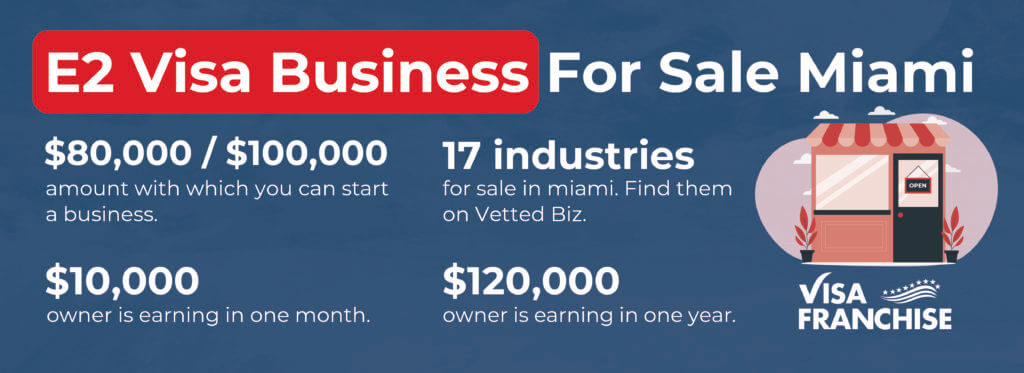Hey, Patrick Findaro here, a co-founder at Vetted Biz and Visa Franchise. We have a lot of clients from all over the world that are thinking of moving to South Florida, and particularly buying an existing business in Miami, or even starting a franchise. But if you're looking to buy an existing business in Miami, in today's video, we're gonna go through some key tips and things that you should consider before you even start the search of buying an existing business in Miami to obtain the E2 visa.
Things to Consider Before You Start Your Search for an E2 Visa Business in Miami, Florida

The Miami rental market has gone up crazy. In Miami Beach, well over 30% year over year. It's becoming a very expensive place to live. Similar prices as Los Angeles, San Diego. If you're looking to rent or buy, it's become very expensive. So when you go to open a business or buy that business for sale in Miami, you have to consider that cost of living has gone up significantly given COVID-19.
If you don't really need to be in Miami and your spouse isn't working here, or it's a business that really benefits from physically being in Miami, we've been advising Visa Franchise clients to look more on the West Coast of Florida and up the coast in Palm Beach County and north of Palm Beach County, as well as Central Florida.

Where to Start Your Search for an E2 Visa Business Outside of Miami
The Gulf Coast, Central Florida, as well as East Coast, but more up past Palm Beach County as just the cost of living has gone up significantly. So if you're looking to buy a business in Miami, you've gotta be making what would've maybe past making $5k, $6k a month from that business, you really should be aiming to make $10,000-plus from that business for sale.
If you're looking to buy an existing business in Miami and the owner is making $10,000 a month, he's generally gonna sell that business for a multiple of earnings, and that's in the ballpark of anywhere from two and a half to five times earnings for businesses under a million dollars in enterprise value. Even though the owner's making $10,000 a month, $120,000 a year, you're probably gonna have to pay $300,000 to $500,000 for that business.

Now, you can start a business, whether it's a franchise or startup, you might not make much money for a year, a year and a half, but there are businesses that you could start with $80,000, $100,000, and after a year and a half, you're making that $10,000 a month.
Thus you do have to pay a big premium to already have that cash flow from day one when you're buying an existing business. And in Miami, I'd say that magic number is $10,000 or more. You gotta look and focus on businesses for sale, where the owner is making at least $10,000 a month.
The cost of living in Miami has increased significantly since the outbreak of COVID-19
Also think, when there's a transition to ownership, usually the business sales and thus the profit go down. So you should really look at businesses at $12,000 or more because when you transition, there might be some clients that leave, that were really tied to that preexisting owner. Some employees might leave. So the revenues and the profits could go down 10%, 20%, or more.
You really have to account for that. The first 12 months there is that transition period, and you're not gonna be making as much money from that business you just bought, or as you forecasted that you're buying in Miami. Hopefully, the income rises up, you know, after 6, 12 months of operating the business, but you should expect a bit of a drop, and I would forecast for 20% drop in income.

In fact, if the previous owner was making $10,000, you should forecast just to make $8,000 a month at least for the first year that you're owning the business. Different industries for sale in Miami that our clients have been exploring are service-based, especially home services as a lot of people are working from home and whether it's getting new windows and selling that new kitchen appliances that they want or refurbishing the whole kitchen or bath, a lot of home service businesses are in demand.
And there's other industries that you gotta check out on our website, Vetted Biz, and basically, 17 different industries that you can explore for businesses for sale in Miami, or if you want to go the franchise route. And we'll leave links to all the franchises that are currently available in the United States that you could potentially open up in Miami or South Florida, as well as businesses for sale in the Miami area.
Conclusion
I hope you thought this video was informative. After listening, tell me, are you more interested in buying an existing business and you're willing to pay that premium and pay, you know, three, four, five times the earnings, or are you looking to start your own business? I'd love to hear from you.

Discover if you qualify to invest in a thriving U.S. franchise and secure your E-2 visa.
Check your eligibility
More Insights You Might Like
Explore related articles packed with expert advice, real stories, and practical tips to support your U.S. visa and relocation journey.





